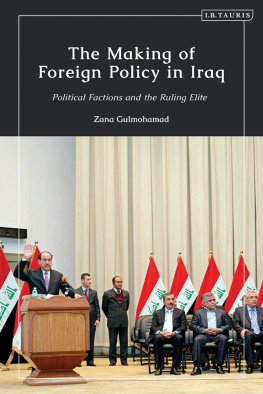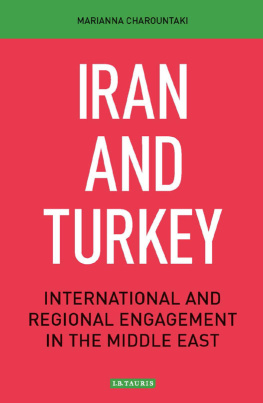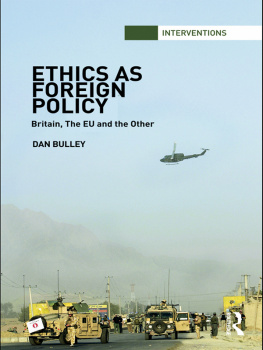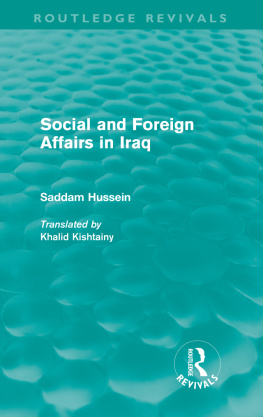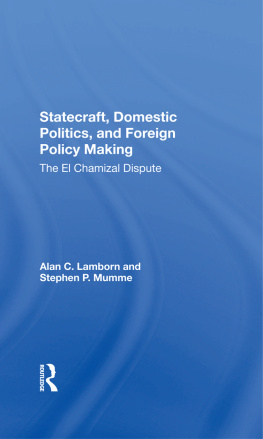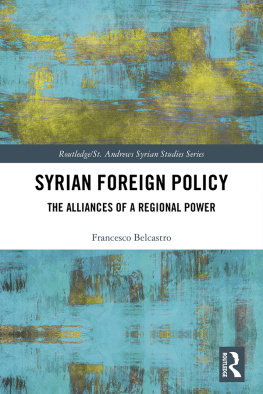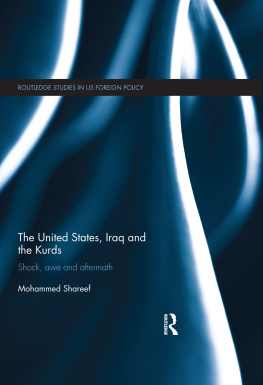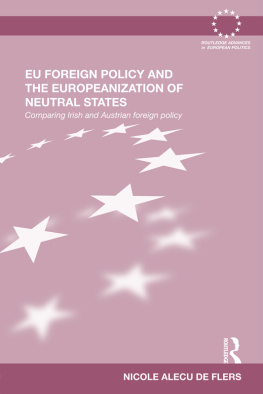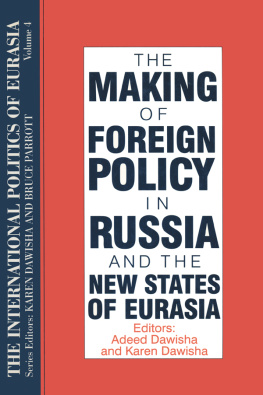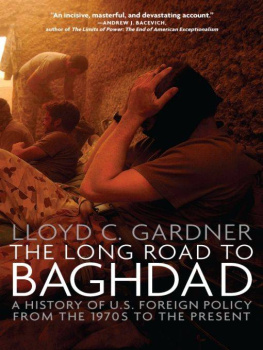THE MAKING OF FOREIGN POLICY IN IRAQ
THE MAKING OF FOREIGN POLICY IN IRAQ
Political Factions and the Ruling Elite
Zana Gulmohamad
For my family
CONTENTS
Chapter 1
MAJOR DOMESTIC ACTORS IN FOREIGN POLICY POST SADDAM
Chapter 2
THE FEDERAL GOVERNMENTS CORE EXECUTIVE BODIES IN FOREIGN POLICY MAKING
Chapter 3
THE KURDISTAN REGIONAL GOVERNMENTS FOREIGN RELATIONS AND FOREIGN POLICY
Chapter 4
THE FEDERAL GOVERNMENTS KEY FOREIGN POLICY PRIORITIES
Chapter 5
REGIONAL INTERFERENCES AND INFLUENCES ON IRAQS FOREIGN POLICY POST SADDAM
This book has been a journey, which would have been arduous without the support of family and friends. My father, Dr Khasraw, has alleviated lifes hurdles that consequently eased the path of work and research. My wife Suzannas support during the research and writing of the manuscript was limitless, and I appreciate her reading the manuscript several times. The smiles of my children brought joy into my office. In February 2013, I began my doctoral research at the Department of Politics and International Relations at the University of Sheffield of which this monograph is the result, and I am grateful for the latters programme that equipped me with the skills to successfully complete my PhD. The advice of my PhD supervisor, Professor Andrew Taylor, was generous and rigorous, and I learned from him not only as a researcher but also as a teacher. A few days after completing my doctoral research in January 2018, the effort to convert it into a book with further development and some modifications started. I greatly appreciate the enthusiasm and insights of Dr Sophie Rudland, the senior editor for Middle East and Islamic Studies at I.B. Tauris, in the development of this research since the beginning. I am thankful to all the interviewees for their time and contributions, which enriched the research. Help from friends, too numerous to name, has been unforgettable during the research and the fieldwork, particularly at the time of travel to Iraq and the Kurdistan Region of Iraq as well as across the UK and Europe. Others I would like to thank for their support include Dr Lisa Stampnitzky, my second PhD supervisor, Sarah Cooke, Dr Rhiannon Vickers and Dr David McCourt. The comments of Professor Charles Tripp and Professor Jonathan Joseph were invaluable. I would like to express my gratitude to the librarians at the University of Sheffield for providing access to resources at the university and also facilitating access to the British Library. Finally, I am thankful to the anonymous reviewers associated with I.B.Tauris who reviewed the manuscript and provided very constructive feedback.
| AAH | Asaib Ahl al-Haq |
| AKP | Adalet ve Kalkinma Partisi (Justice and Development Party) |
| AQI | Al-Qaeda in Iraq |
| CTG | Counter Terrorism Group (Kurdish, PUK) |
| EU | European Union |
| EUP | European Union Parliament |
| FDI | Foreign Direct Investment |
| GCC | Gulf Cooperation Council |
| IA | Iraqi Army |
| IAF | Iraqi Accord Front |
| ICR | Iraqi Council of Representatives |
| I-CTS | Iraqi Counter Terrorism Service |
| IED | Improvised Explosive Device |
| IGC | Iraqi Governing Council |
| IIG | Iraqi Interim Government |
| IIP | Iraqi Islamic Party |
| I-MOFA | Iraqi Ministry of Foreign Affairs |
| I-MONS | The Iraqi Ministry of National Security |
| INA | Iraqi National Accord |
| IRGC-QF | Iranian Revolutionary Guards Corps Quds Force |
| IS | Islamic State of Iraq and al-Sham Levant al-Dawla al-Islamiya fi al-Iraq wa al-Sham (Daesh) |
| ISCI | Islamic Supreme Council of Iraq |
| ISF | Iraqi Security Forces |
| ITG | Iraqi Transitional Government |
| JAM | Jaish al-Mahdi |
| KDP | Kurdistan Democratic Party |
| KNA | Kurdistan National Assembly |
| KNC | Kurdistan National Council |
| KP | Kurdistan Parliament |
| KRG | Kurdistan Regional Government of Iraq |
| KR-I | Kurdistan Region of Iraq |
| KRP | Kurdistan Regions Presidency |
| KRSC | Kurdistan Region Security Council |
| KSA | Kingdom of Saudi Arabia |
| MCNS | Ministerial Committee for National Security |
| MIT | Mill stihbarat Tekilat (Turkeys National Intelligence Organization) |
| MNSTC-I | Multi-National Security Transition Command Iraq |
| NATO | North Atlantic Treaty Organization |
| NTM-I | NATO Training Mission Iraq |
| OPEC | Organization of the Petroleum Exporting Countries |
| PCNS | Political Council on National Security |
| PKK | Kurdish Workers Party |
| PL | Presidency Law of Kurdistan Region of Iraq |
| PMF | Popular Mobilization Forces ( al-Hashd al-Shaabi ) |
| PUK | Patriotic Union of Kurdistan |
| PYD | Democratic Union Party |
| SLC | State of Law Coalition |
| SOFA | Status of Forces Agreement |
| TAL | Transitional Administrative Law |
| UIA | United Iraqi Alliance |
The nascent and weak political institutions in Iraq post 2003 led many to question the existence and process of its foreign policy making. After Saddams regime was toppled by the US-led coalition, Iraqs political elites and factions and to a certain degree and during confined periods the United States and neighbouring states have shaped its foreign policy making and orientations. The first decade post Saddam witnessed the ascent of the Kurdistan Regional Government of Iraq (KRG) amid the insecurity in Baghdad, and the effectiveness of the federal government of Iraq in policymaking was questioned. Division in foreign policy messages emanated from Iraq, and factionalism and nepotism at all levels of governance escalated particularly during the tenure of Prime Minister Nouri al-Maliki, who had authoritarian tendencies. These factors and the rise of Islamic State (IS) brought the integrity and survival of Iraqs polity to the edge of the abyss. Today its foreign relations and foreign policy have been revitalized but still face domestic and external challenges.
Iraqs foreign policy ( al-Siyasa al-Kharijiyia al-Iraqyia ) has been a contested and limited area of study partly because of the intricate, unstable and fragmented political landscape that has moulded Iraqs policymaking since the states creation in the 1920s. This book offers unique insights and details about the previously under-researched subject of Iraqs foreign policy making post Saddam. In addition to a brief analysis of Iraqs foreign policy before 2003, the books focus stretches from the post 2003 period to the middle of 2019. The main question I address is: how is foreign policy made in Iraq? Post Saddam, Iraqs foreign policy became a more complex process; Iraq has been going through a transformational phase where more actors domestically and externally are involved in policymaking. I investigate the making of foreign policy by examining which elites, political forces, key figures and core executive bodies have been involved in conducting foreign relations and shaping Iraqs incoherent foreign policies post 2003. What are their roles and priorities, and who has superiority in foreign policy making? In this book, I map out the actors that contribute to Iraqs foreign policy making: the prime minister, the president, the foreign minister, the Speaker of the Iraqi Council of Representatives (ICR) as well as political factions, bureaucratic bodies and prominent charismatic individuals, such as the highest religious Shia reference al-Marjaia in Iraq Grand Ayatollah Sayyid Ali al-Husseini al-Sistani and a populist Shia political figure and cleric Muqtada al-Sadr. The process of the Iraqi federal governments and the KRGs foreign policies and their imperatives or priorities and the neighbouring states influences on them are thoroughly explained. By examining Iraqi factions and elites contribution to foreign policy making I demonstrate how bureaucratic institutions and policymaking have become politicalized and to some degree securitized.

